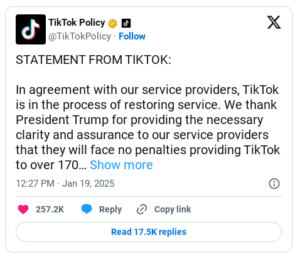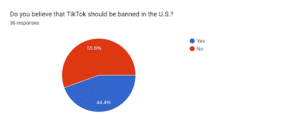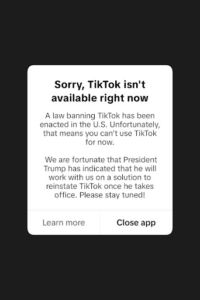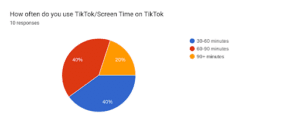What We’d Lose: The Impact of a TikTok Ban on High School Students
April 8, 2025
By Ozzie Hollander ’26
For many students, TikTok is more than just a platform for entertainment; it’s a place to record their lives. Whether it’s sharing funny moments, creative dances, or personal milestones, TikTok has become a digital scrapbook for students to document their experiences and memories.
 Background/Context
Background/Context
In 2020, President Donald Trump wanted to ban TikTok due to national security concerns, arguing that the app could be used to collect data on U.S. users. However, despite efforts, the ban was never fully implemented.
In 2025, after President Trump took office again, the administration did not immediately move forward with the proposed ban but instead launched a review of national security concerns around TikTok. On January 19, 2025, TikTok was banned and disappeared from U.S. app stores. On January 20, 2025, President Trump signed an executive order delaying the enforcement of any potential ban, allowing a 75-day period to further examine TikTok’s data practices and its potential threat to U.S. security.
 Personal Response
Personal Response
Hillel Wolkenfeld ’26, a regular user of the app, shared his reflections on how he felt when the ban was initially implemented. “I felt a little concerned and then experienced feelings of despair once the ban was activated,” said Wolkenfeld. For Wolkenfeld, TikTok wasn’t only an app for entertainment, but it was also a space where he could document activities as if he was keeping a digital journal. “I worried about losing my streaks and the memories I had stored on the app,” Wolkenfeld added.
Similarly, Dr. Ariel Kramer-O’Brian, Director of Educational Support, reflected on how personal milestones are often shared through social media. Dr. Kramer doesn’t have TikTok, but mentioned that “if it had happened on Instagram, I would have screenshotted my posts to save them and the memories that I had from them. My wedding pictures are on there. The announcement for the birth of my son is on there. Yes, I have pictures on my phone, but the captions help with the moment.” For Dr. Kramer, the emotional connection to these digital moments highlights the value many students place on platforms like TikTok, even if they also recognize the potential risks.
 Rabbi Houben, Upper School Principal, strongly supports the TikTok ban, believing it’s necessary for students’ well-being. “I support the ban, and I think it’s the right thing to do,” he said, arguing that TikTok hurts its users by “rotting [their] brain.” He criticized the app’s addictive nature, which leads to mindless scrolling and wastes time. One example that Rabbi Houben recalled was when Upper School students would film TikToks in the hallways throughout the school day. Rabbi Houben also expressed his concern on how TikTok can steal its users’ identities. He believes there are better ways to preserve memories and connect without the negative effects of TikTok.
Rabbi Houben, Upper School Principal, strongly supports the TikTok ban, believing it’s necessary for students’ well-being. “I support the ban, and I think it’s the right thing to do,” he said, arguing that TikTok hurts its users by “rotting [their] brain.” He criticized the app’s addictive nature, which leads to mindless scrolling and wastes time. One example that Rabbi Houben recalled was when Upper School students would film TikToks in the hallways throughout the school day. Rabbi Houben also expressed his concern on how TikTok can steal its users’ identities. He believes there are better ways to preserve memories and connect without the negative effects of TikTok.
Losing a Digital Space
TikTok has become a central part of life for many high school students, not just as a form of entertainment, but as a digital space to share moments.
While discussions about TikTok’s safety, mental health effects, and privacy issues are crucial, the emotional reactions from students reveal a deeper concern: a fear of losing something significant. TikTok has become an essential space for students to express themselves, connect with others, and preserve memories. Without it, many worry that their voices, memories, and even sources of income could vanish.
In a recent poll of 39 students, 44.4% believe TikTok should be banned. Concerns like addiction, freedom of speech, and security risks were cited as the main reasons for supporting a ban. However, despite these worries, only 25.6% of students actively use the app, and many have strong feelings about what they would miss if it were no longer available. In fact, 25.8% of students said they would feel curious about the lasting effects of the ban, while 19.4% expressed sadness, and 9.7% felt anger.
 Along with these concerns, students also voiced worries about the impact TikTok has on mental health. “It’s horrible for mental health,” said one student, while another highlighted how the app is designed to be addictive, particularly for young users whose brains are still developing. Other students pointed to the potential for cyberbullying and social isolation as consequences of TikTok use. One student noted that “spending hours on TikTok daily makes it harder to interact in the real world,” suggesting that excessive screen time could lead to isolation.
Along with these concerns, students also voiced worries about the impact TikTok has on mental health. “It’s horrible for mental health,” said one student, while another highlighted how the app is designed to be addictive, particularly for young users whose brains are still developing. Other students pointed to the potential for cyberbullying and social isolation as consequences of TikTok use. One student noted that “spending hours on TikTok daily makes it harder to interact in the real world,” suggesting that excessive screen time could lead to isolation.
Despite these concerns, some students acknowledged TikTok’s value as a source of entertainment and creative expression. “I think TikTok should only be banned if it is still run by a company heavily influenced by the Chinese Communists,” one student shared, suggesting that the platform could still serve as an important space for free expression if managed differently. TikTok has also become a way for workers to make money. “Lots of people make money from it by creating content, and that would take people’s jobs away if they banned it,” one anonymous Upper School student explained.
A World Without TikTok
TikTok has made a lasting impact on how we interact with the world around us. It’s not only an app, but also a platform where memories are made, creativity thrives, and connections are built.
The question still stands: Should TikTok be banned, and if so, at what cost? Whether we use the app actively or just follow the trends, one thing is clear. The absence of TikTok would leave a large impact on the world today.
The potential loss of platforms like TikTok is about more than just losing an app; it’s about losing a key space for self-expression and building communities in our digital world. While a less tech-focused life sounds nicer, it would also mean giving up unique ways to express oneself. Even with its challenges, like mental health issues and privacy concerns, social media brings people together and helps them connect with important issues.
How can we protect online spaces for self-expression? Our generation has become skilled at navigating the digital world and shaping our online identities.
How do we balance the power of technology with users’ well-being, and what kind of digital space do we want to create for future generations to connect, express themselves, and explore who they are?

